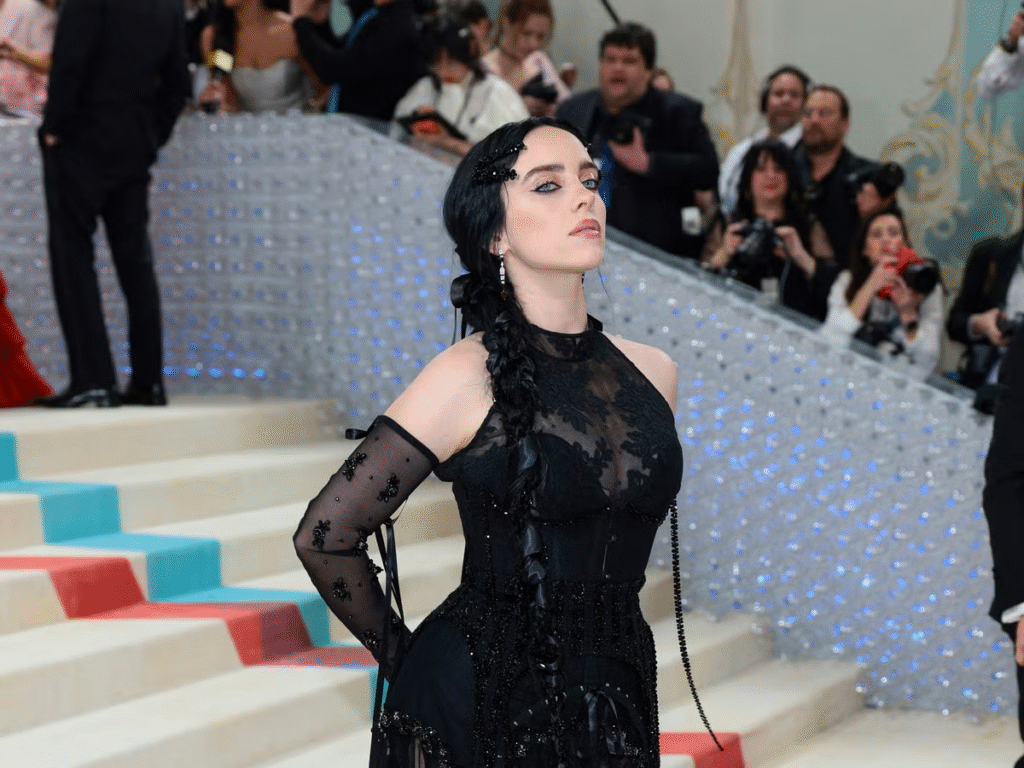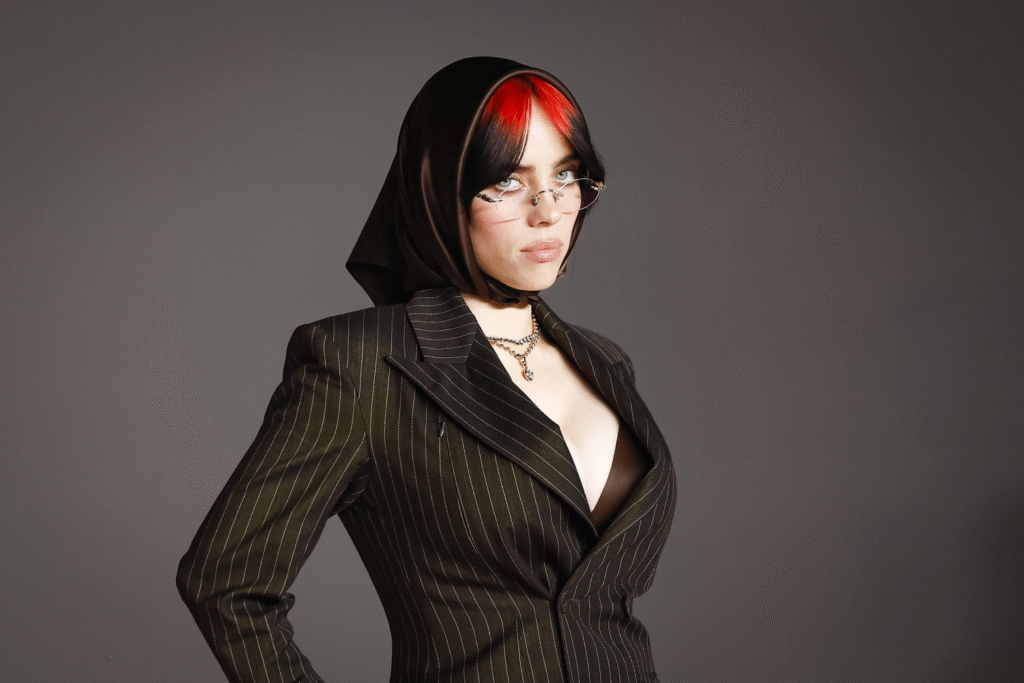In the ever-evolving landscape of popular music, few artists have made as profound and immediate an impact as Billie Eilish. Born Billie Eilish Pirate Baird O’Connell in Los Angeles, California, on December 18, 2001, Eilish emerged seemingly out of nowhere, transforming from a teenager making music in her bedroom into one of the defining voices of her generation. With her whispery vocals, genre-blending sound, and distinctive aesthetic, Billie Eilish has redefined what it means to be a pop star in the modern era.
Early Life and Musical Roots
Billie was raised in a family steeped in creativity. Her parents, Maggie Baird and Patrick O’Connell, were both actors and musicians, fostering a home environment filled with artistic exploration. Homeschooling allowed Billie and her older brother, Finneas O’Connell, the flexibility to dive deep into their passions. Finneas, a talented songwriter and producer, would become her closest collaborator, producing nearly all of Billie’s music from their makeshift home studio.
Eilish’s early musical influences were diverse, ranging from The Beatles and Avril Lavigne to hip-hop and indie music. She was also drawn to unconventional artists like Tyler, the Creator and Lana Del Rey, whose moody, introspective styles would inform her own sonic palette.
The Breakthrough: “Ocean Eyes”

Billie Eilish’s career took off in 2015 when she uploaded the song “Ocean Eyes” to SoundCloud. Originally written by Finneas for his own band, the haunting ballad showcased Billie’s ethereal voice and immediately caught the attention of listeners and industry professionals. The song went viral, amassing millions of plays and leading to a deal with Interscope Records.
“Ocean Eyes” wasn’t just a fluke; it marked the beginning of a meteoric rise. Her ability to channel complex emotions through minimalistic production and poetic lyrics made her stand out in a sea of overproduced pop acts.
A Star is Born: When We All Fall Asleep, Where Do We Go?
In 2019, Billie Eilish released her debut full-length album, When We All Fall Asleep, Where Do We Go?, which was both a critical and commercial triumph. The album, produced entirely by Billie and Finneas in their childhood home, debuted at number one on the Billboard 200 and spawned hit singles such as “bad guy,” “bury a friend,” and “when the party’s over.”
The album’s success was not only about catchy hooks—it was about innovation. Billie’s sound defied genre conventions, blending electropop, trap, and industrial sounds with a cinematic flair. Lyrically, she explored themes of mental health, fame, nightmares, and identity, all delivered with an emotional honesty that resonated deeply with Gen Z listeners.
Her visual presentation also broke the mold. With oversized clothing, neon hair, and dark, surreal music videos, Billie actively pushed against the hyper-sexualized image often expected of young female artists. Her refusal to conform became a powerful statement about body autonomy and self-expression.
Grammy Sweep and Global Stardom

At just 18 years old, Billie Eilish made history at the 2020 Grammy Awards, becoming the youngest artist to win in all four major categories—Album of the Year, Record of the Year, Song of the Year, and Best New Artist—in the same year. This feat had only been accomplished once before, by Christopher Cross in 1981.
This moment solidified Billie’s place not just as a pop phenomenon but as a serious artist with the respect of her peers and critics alike. She followed up with several singles and a James Bond theme, “No Time to Die,” which earned her both an Academy Award and a Golden Globe, cementing her cross-genre and cross-media appeal.
A New Era: Happier Than Ever
In 2021, Billie released her sophomore album, Happier Than Ever. While the first album had a dreamlike quality, this one was more grounded and mature. Tracks like “Your Power,” “NDA,” and the title track showcased her evolution both lyrically and sonically. She tackled themes of exploitation, toxic relationships, and the pressures of fame, often in a stripped-down, acoustic style.
The album once again received critical acclaim, proving that Eilish was not a one-hit wonder but a complex artist capable of growth and reinvention. Her transformation—both musically and aesthetically—was evident. She traded her signature neon green hair for a platinum blonde look, signaling a shift not just in appearance but in artistic direction.
The Billie Eilish Effect

Beyond the music, Billie Eilish has had a significant cultural impact. She’s become an icon for a generation navigating mental health, digital life, and societal pressures. Eilish speaks openly about her own struggles with depression, anxiety, and body dysmorphia, creating a safe space for fans to feel seen and understood.
She’s also been a vocal advocate for sustainability and climate action. Her world tours aim to reduce environmental impact, and she’s frequently used her platform to speak out against fast fashion and animal cruelty.
Fashion, too, has been a medium for her self-expression. Collaborations with brands like Gucci, Nike, and H&M show how she’s redefining fashion norms, often choosing baggy, androgynous styles to combat objectification. Her aesthetic challenges the status quo, encouraging others to dress for themselves rather than for societal approval.
A New Kind of Role Model
Unlike traditional pop stars, Billie Eilish doesn’t pretend to have it all figured out. She’s unfiltered, vulnerable, and often contradictory—and that’s precisely what makes her relatable. In a world of polished social media personas, her authenticity is revolutionary. She frequently addresses the dangers of internet culture, parasocial relationships, and the unrealistic expectations placed on young women.
Her 2021 Apple TV+ documentary, Billie Eilish: The World’s a Little Blurry, gave fans a behind-the-scenes look at her rapid rise to fame. Rather than glorifying celebrity life, it painted a picture of a young woman grappling with the weight of global stardom while trying to hold onto her sense of self.
What’s Next for Billie Eilish?

As of 2025, Billie Eilish shows no signs of slowing down. With a third album rumored to be in development and continued forays into fashion, film, and activism, she remains one of the most versatile and influential artists of her time. Each era of her career marks a transformation, not just in sound or style, but in mindset and message.
She is not merely a pop star; she’s a cultural force—a mirror reflecting the anxieties, hopes, and complexities of a new generation. And as she continues to evolve, so too does the world of music and the definition of modern celebrity.
Conclusion
Billie Eilish has done more than just make music—she has reshaped the rules of the industry. By staying true to herself, embracing vulnerability, and constantly pushing artistic boundaries, she has become a voice for a generation hungry for authenticity. Whether she’s whispering haunting melodies or challenging fashion norms, Billie Eilish is a singular force—a young woman rewriting the future of pop on her own terms.
(FAQs) About Billie Eilish
1. How did Billie Eilish become famous?
Billie Eilish rose to fame in 2015 when she uploaded the song “Ocean Eyes” to SoundCloud. The track, written and produced by her brother Finneas, went viral due to its haunting vocals and emotional depth. This led to a record deal and quickly established her as a rising star in the music industry.
2. Who is Finneas and what is his role in Billie’s music?
Finneas O’Connell, Billie’s older brother, is a key figure in her success. He is her primary collaborator—producing, co-writing, and performing on most of her music. Their close bond and creative partnership have been essential to developing her unique sound.
3. What are Billie Eilish’s biggest achievements?
Some of Billie Eilish’s major achievements include:
Becoming a global fashion and cultural icon.
Winning 7 Grammy Awards, including all four major categories in 2020.
Releasing a James Bond theme song, “No Time to Die,” which won an Oscar.
Having multiple chart-topping albums like When We All Fall Asleep, Where Do We Go? and Happier Than Ever.
4. What makes Billie Eilish different from other pop stars?
Billie Eilish stands out for her:
Creative control, working closely with her brother from home studios instead of major commercial producers.
Unique sound, blending electropop, alternative, and minimalist influences.
Authentic image, including her rejection of traditional beauty standards and body image expectations.
Emotional openness, often addressing mental health, fame, and identity in her lyrics.
5. Is Billie Eilish involved in any activism or social causes?
Yes. Billie Eilish is outspoken on a number of issues, including:
Body positivity and self-expression, encouraging people to embrace their individuality and reject societal pressure.
Mental health awareness, sharing her personal struggles to help others.
Climate change and sustainability, promoting eco-friendly touring and fashion.


















































































